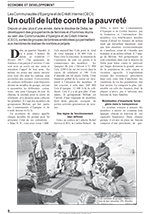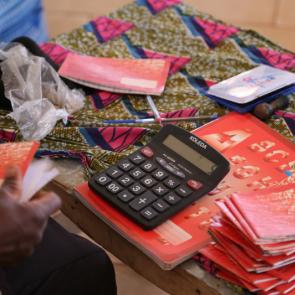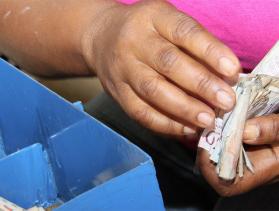About Microfinance
Most formal financial institutions are unable to reach the world’s poorest people, who greatly need access to appropriate and affordable financial services. Catholic Relief Services’ microfinance programs in developing countries work through microfinance associations and their member institutions, as well as with informal or community-based savings groups.
Both approaches encourage clients to save and to borrow for investments in income-generating microenterprises. Both reach very poor households and communities, and help to create a sustainable financial base for local community development.
CRS microfinance programs in developing countries place a major focus on savings-led microfinance—helping community members to form groups, pool their savings, and make loans to each other. This approach has created economic opportunities for more than 3.2 million people who live in the world’s most impoverished areas.
CRS provides training and capacity strengthening to new savings groups, using a highly sustainable fee-for-service, market-based, agent approach. Upon completing their first 12-month cycle, groups can operate on their own. The subsequent cycle begins immediately after the shareout meeting, making the end of the previous cycle. Some of these groups are now in their ninth cycle.
Learn more about our savings groups.
A tool to fight poverty – a journal report from Chad (French language only)
In March 2017, Tchad et Culture published a positive discussion of how CRS and SILC help community members fight poverty in Doba, Chad.
For just over a year, in the Diocese of Doba, Chad, groups of men and women have met in Savings and Internal Lending Communities (SILC), a type of improved tontine that allow for the implementation of numerous projects.
(Depuis un peu plus d’une année, dans le diocèse de Doba, se développent des groupements de femmes et d’hommes réunis au sein des Communautés d’Epargne et de Crédit Interne (CECI), sortes de groupes de tontines améliorées qui permettent aux membres de réaliser de nombreux projets.)
Program Subsectors
Our Impact
Our programs develop community-led and managed savings and lending services. We link the poor who have limited or no access to capital in the formal financial markets to additional financial (microinsurance) and non-financial (financial education. marketing basics, business basics for microenterprise, and agricultural extension) services. In fiscal year 2016 these savings services supported beneficiaries through 77 projects in 34 countries.
Capacity at a Glance
By the Numbers
Beneficiaries in Fiscal year 2015: More than 5 million
Projects: 89 projects
Countries: 41 countries
Research & Publications
-
Manuals
Private Service Provider Implementation Manual
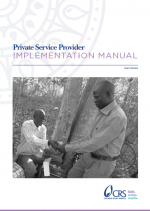
Learn how to launch savings groups managed by private service providers rather than traditional field agents paid by the development project. More
-
Papers/Reports
How SILC Members Use Their Money
A Study of SILC Fund Use in Zambia
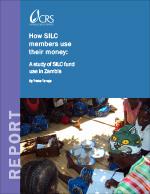
Learn how members of savings groups use their money in Zambia. More
Donation Form
Join Footsteps in Faith today!
Bring lasting change to children and their famlilies. Become a regular donor and for just 80 cents a day, you can make a difference!

